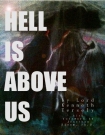Hell Is Above Us: The Epic Race to the Top of Fumu, the World's Tallest Mountain by Jonathan Bloom (bookreader TXT) 📗

- Author: Jonathan Bloom
Book online «Hell Is Above Us: The Epic Race to the Top of Fumu, the World's Tallest Mountain by Jonathan Bloom (bookreader TXT) 📗». Author Jonathan Bloom
Alas, that did not turn out to be his assignment. “Captain Hoyt, have you ever heard of Operation Barrymore?” the commanders asked him. Randolph had not heard of it. The commanders went on to explain the details of the operation, one of the most unique but failed operations in American and Chinese military history. The plan, devised by General William Felcher and approved by President Roosevelt, was to put on a radio play for the enemy so convincing in its execution that the enemy would think it real and respond accordingly. Going under the assumption the enemy was listening in, all Chinese soldiers in charge of radio communications were to be given “parts” to play. These parts required them to intersperse their normal communications with occasional lines from a script written by a team of top American playwrights. The soldiers were also to be given acting lessons from Chinese Xiangsheng actors, American stage actors, and given direction from American directors (Although his involvement would make perfect sense after the infamy of “War of the Worlds,” it has never been confirmed whether Orson Welles took some supporting part in the operation. Welles has repeatedly and adamantly denied any involvement. Given that Operation Barrymore occurred during production of Citizen Kane, one has no reason to question Welles on the matter). “One of our nation’s most successful exports is entertainment” explained the commanders. “We might as well use it to our military advantage.”
The “play” the Chinese soldiers were going to act out involved a natural disaster. During their coded communications about troop, ship, and airplane positions, the soldiers would pretend an earthquake had occurred somewhere off the coast of China. Then, moments later, they would act as if a tsunami of awesome magnitude was ravaging villages along the Chinese shoreline. Soldiers involved in the play who were along the coast in places like Shanghai would pretend to be drowned: screaming, gurgling, and then radio silence. If all went as planned, then the Japanese would be quick to evacuate their southern shores. This would leave them open to attack by air. The Chinese assisted by the Flying Tigers would then swoop in with a massive aerial assault on multiple targets, including naval ports, factories, and airfields in Nagasaki, the Ryukyu Islands, and Pusan in Japanese-occupied Korea.
“We need a top-notch captain to get all of this American talent overseas. Can we count on you?” Discouraged by the nature of his cargo but ever the patriot, Randolph shook their hands and swore to keep the operation his secret. There was no dotted line to sign on because the military wanted no paper trail.
About one month later, Randolph was contacted by his brother. William explained he required a ship to India for himself and his team of five other men. Randolph could not believe the perfection of the request’s timing. Little else about the request was perfect. Picking up stowaways during a military mission was a major security breach. Randolph could get court marshaled if anyone found out. But such was the nature of their relationship; William had lorded over his brother since childhood, fathering him when Spalding Hoyt had not been around. Fighting back was not an option. William was larger and his temper was enough to keep anyone at bay. The two siblings were no different as adults. William Hoyt made a demand and Randolph followed it without question.
Randolph left from the naval base in Los Angeles on May 23rd with ten writers, twenty-five actors, three directors and his crew of ten men on board. Before setting the course for Burma, he reluctantly ordered his crew to drop anchor off of Cameo Cove in Corona Del Mar so they could pick up some more individuals. The passengers and crew were likely confused by this deviation. According to Randolph’s ship log, he quelled their concerns by explaining the detour as “top secret.”
“I said to everyone, ‘These men we are picking up, they are trained killers; mercenaries being sent over enemy lines to help take back China from the Japs. They are ground support for the Flying Tigers. They are codenamed the Flightless Tigers.’ I probably could have come up with a better name if I had not been put on the spot.”
His explanation seemed to be enough to gain the crew’s acceptance. After all, it must have been very intriguing to be making a top secret rendezvous on an already top secret mission. They picked up William, his team, and their equipment at approximately seven o’clock at night. Randolph turned the bow of the Auxesis into the sunset and started the journey to Rangoon.
On the journey with William Hoyt were five men. Hoyt apparently had superior luck to Junk, finding mostly master climbers who happened to be in situations allowing them to walk away from their lives for one half of a year at a moment’s





Comments (0)